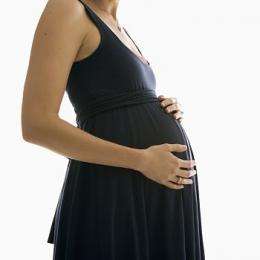Elevated mercury, cadmium block in-vitro pregnancy

(Medical Xpress) -- A new University at Albany study finds background exposure to levels of mercury and cadmium commonly found in the environment may significantly interfere with early pregnancy through in-vitro fertilization (IVF).
First author Michael S. Bloom of UAlbany's School of Public Health, and Dr. Victor Y. Fujimoto, senior author, of the University of California, San Francisco, discovered toxic metals occurring ubiquitously in air, water, and food at levels considered safe for the general public, present alarming dangers to the pregnancies of women undergoing in-vitro fertilization.
The study was published in the July online journal Reproductive Toxicology.
After adjusting for factors including age, race, and smoking, Bloom found that a slight increase of one microgram per liter (ug/L) of blood mercury is associated with a diminished likelihood of becoming pregnant through in-vitro fertilization -- 35 percent in clinical in-vitro pregnancies and 33 percent in biochemical pregnancies. In the same set of findings, a one ug/L blood increase of cadmium reduced pregnancy success by 94 percent and 82 percent in clinical and biochemical pregnancies, respectively.
Biochemical, or chemical pregnancy, is an early pregnancy confirmed by blood tests for HCG (human chorionic gonadotropin), a hormone produced by the embryo. Clinical pregnancy is identified by the presence of a gestational sac detected by ultrasound. The likelihood of IVF success was measured at the time of egg (oocyte) retrieval for the purposes of fertilization.
"Most importantly, exposure to mercury and cadmium at low ‘background’ concentrations typical for U.S. residents, those not related to specific workplace exposures or accidental release, may hinder pregnancy among couples undergoing in-vitro fertilization," Bloom said.
"The lifestyle factors that contribute to infertility and the success or failure of in-vitro fertilization remain relatively obscure," said Dr. Fujimoto. "Studies such as ours will broaden our understanding so that modifiable environmental factors of IVF success are identified and the information is disseminated to the public."
Mercury and cadmium are natural components of the earth's environment, but can be accumulated or concentrated under certain conditions. Mercury is elevated in sources that include emissions from coal-burning power plants, fish, shellfish, and some herbal treatments. Cadmium is found in cigarette smoke, phosphate-based fertilizers and sewage sludge, plants grown in cadmium-adulterated soil, organ meats such as liver and kidneys, mollusks, fossil fuel combustion emissions, and discharge from steel and iron production plants.
Other researchers involved in the study include Patrick J. Parsons and Amy J. Steuerwald of the New York State Department of Health; Richard W. Browne, University at Buffalo; and Gloria Cheng, University of California, San Francisco.
No direct effects were detected in men, but higher urine cadmium content did link to reduced pregnancy.















